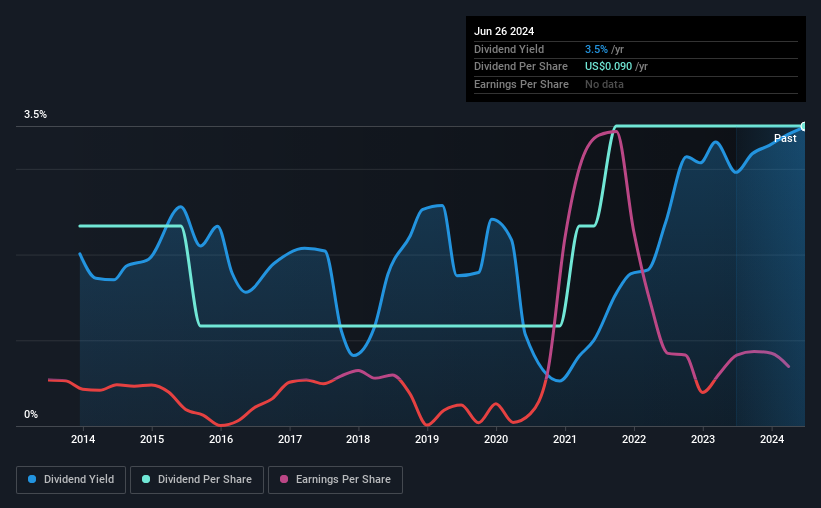U.S. Global Investors (NASDAQ:GROW) Is Due To Pay A Dividend Of $0.0075
The board of U.S. Global Investors, Inc. (NASDAQ:GROW) has announced that it will pay a dividend of $0.0075 per share on the 29th of July. The dividend yield will be 3.5% based on this payment which is still above the industry average.
Check out our latest analysis for U.S. Global Investors
U.S. Global Investors' Earnings Easily Cover The Distributions
Impressive dividend yields are good, but this doesn't matter much if the payments can't be sustained. At the time of the last dividend payment, U.S. Global Investors was paying out a very large proportion of what it was earning and 131% of cash flows. This is certainly a risk factor, as reduced cash flows could force the company to pay a lower dividend.
Over the next year, EPS could expand by 11.7% if recent trends continue. Under the assumption that the dividend will continue along recent trends, we think the payout ratio could be 69% which would be quite comfortable going to take the dividend forward.
Dividend Volatility
While the company has been paying a dividend for a long time, it has cut the dividend at least once in the last 10 years. The dividend has gone from an annual total of $0.06 in 2014 to the most recent total annual payment of $0.09. This implies that the company grew its distributions at a yearly rate of about 4.1% over that duration. Modest growth in the dividend is good to see, but we think this is offset by historical cuts to the payments. It is hard to live on a dividend income if the company's earnings are not consistent.
U.S. Global Investors' Dividend Might Lack Growth
With a relatively unstable dividend, it's even more important to see if earnings per share is growing. U.S. Global Investors has seen EPS rising for the last five years, at 12% per annum. The payout ratio is very much on the higher end, which could mean that the growth rate will slow down in the future, and that could flow through to the dividend as well.
The Dividend Could Prove To Be Unreliable
Overall, it's nice to see a consistent dividend payment, but we think that longer term, the current level of payment might be unsustainable. In general, the distributions are a little bit higher than we would like, but we can't ignore the fact the quickly growing earnings gives this stock great potential in the future. We would be a touch cautious of relying on this stock primarily for the dividend income.
Companies possessing a stable dividend policy will likely enjoy greater investor interest than those suffering from a more inconsistent approach. Still, investors need to consider a host of other factors, apart from dividend payments, when analysing a company. Taking the debate a bit further, we've identified 2 warning signs for U.S. Global Investors that investors need to be conscious of moving forward. If you are a dividend investor, you might also want to look at our curated list of high yield dividend stocks.
Have feedback on this article? Concerned about the content? Get in touch with us directly. Alternatively, email editorial-team (at) simplywallst.com.
This article by Simply Wall St is general in nature. We provide commentary based on historical data and analyst forecasts only using an unbiased methodology and our articles are not intended to be financial advice. It does not constitute a recommendation to buy or sell any stock, and does not take account of your objectives, or your financial situation. We aim to bring you long-term focused analysis driven by fundamental data. Note that our analysis may not factor in the latest price-sensitive company announcements or qualitative material. Simply Wall St has no position in any stocks mentioned.
Have feedback on this article? Concerned about the content? Get in touch with us directly. Alternatively, email editorial-team@simplywallst.com

 Yahoo Finance
Yahoo Finance 
